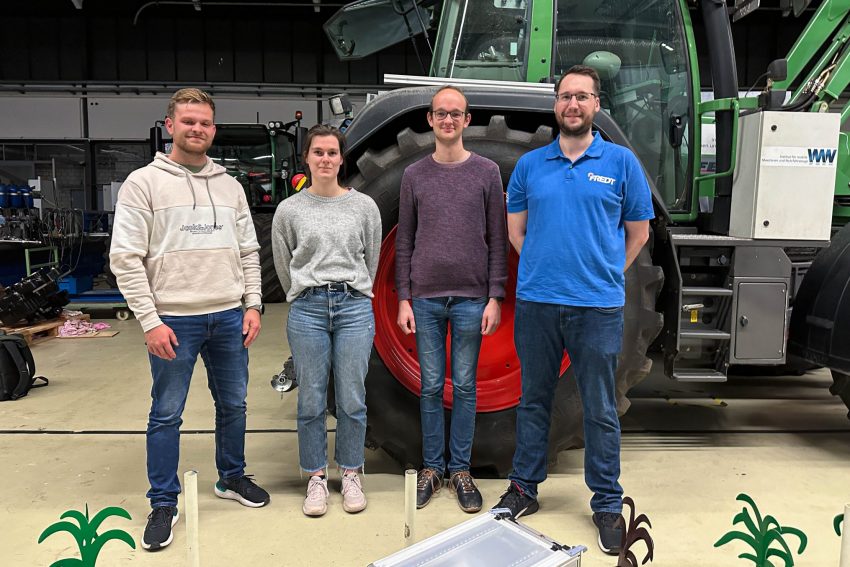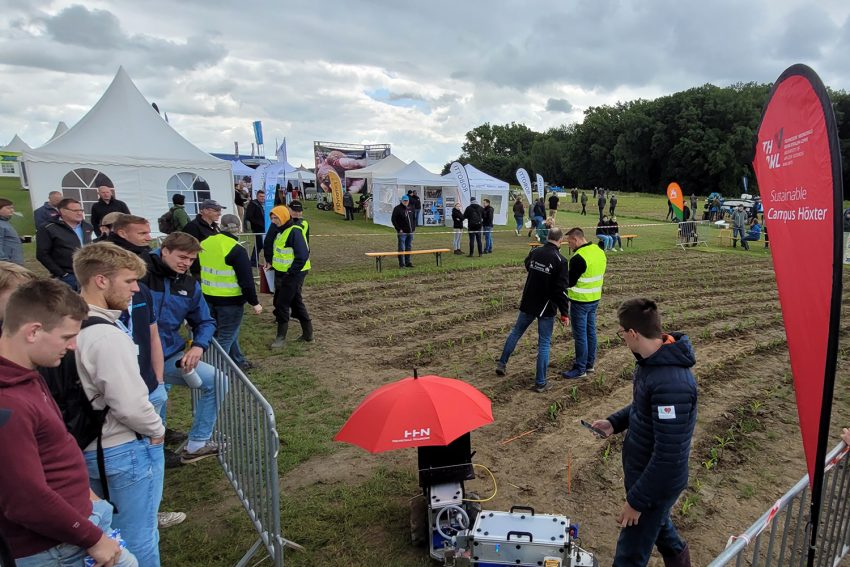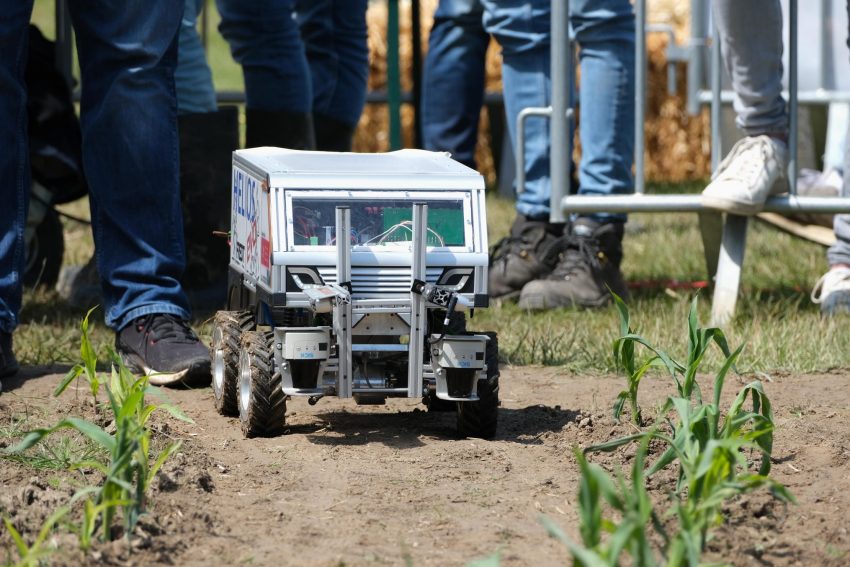High tech in the cornfield Students at TU Braunschweig build world-class field robots
A field, narrow rows and the question: How do I navigate here without GPS? What is an everyday problem for many farmers is a technical challenge for the student initiative FREDT. With their enthusiasm for mechanical engineering, computer science and innovation, students at Technische Universität Braunschweig are developing autonomous robots that have the potential to revolutionise agriculture. Their prototypes have achieved gold status: in June 2024, the team was crowned winner of the Field Robot Challenge for the fifth time. The title was in the balance right up to the end.

The team behind the student initiative FREDT became field robot world champions in 2024. Photo credits: Hannah Kreß/TU Braunschweig
A cornfield in the middle of nowhere. Helios Evo precisely navigates its way through the rows. It has a mission: to detect obstacles and apply plant protection products in a targeted manner. All without GPS. Helios Evo is a robot, and a pretty successful one at that – perhaps the best in its field: in 2024, it won the World Championship for field robots, ‘once again’. It owes its success to the members of the student initiative FREDT.
Robotics meets world championship
FREDT stands for passion for autonomous robotics. Since 2004, the team has been developing and improving autonomous robots for off-road navigation without GPS. Their main motivation is participating in the annual Field Robot Event. Every year, around 15 student teams from all over the world compete against each other with robots that navigate autonomously through a field and complete challenges. How they do this is up to the teams. Cameras, laser scanners, sensor fusion – everything except GPS sensors is allowed.
“The idea behind the competition is to find an alternative to GPS for agriculture,” explains Enrico Schleef, chairman of FREDT. „GPS is expensive, requires a complex infrastructure with reference stations and is not always reliable. Our goal is to build robots that can navigate without satellite support.“

Around 15 student teams from all over the world compete against each other every year in the Field Robot World Championship, with robots that navigate autonomously through a field. Photo credits: FREDT e.V./TU Braunschweig
Most of the challenges vary from year to year. Sometimes deer have to be detected in tall grass with the help of AI (for animal welfare during harvest), sometimes the coordinates of objects in the field have to be determined, or plants have to be sprayed precisely to revolutionise spraying in agriculture. There is almost always a freestyle category in which teams can come up with their own ideas for other agricultural processes that could be supported by robot applications.
Laser scanners and cameras combined
The technology has been refined for years to ensure that the teams are well prepared for the competitions. First came the female robot Gaia, followed less than a year later by Helios. “We have continuously developed Helios – the electronics in particular were completely redesigned in 2019. Helios then became Helios Evo,” says Tristen Vaeckenstedt, who has been part of the initiative since 2022. The core system is based on three laser scanners, supplemented by cameras that play a key role in certain tasks, such as detecting obstacles or animals. “Theoretically, we could navigate using cameras alone, but we know from experience that laser scanners are more reliable,” explains Anna Ricken, who has been with the team for around a year.

Helios Evo at the Field Robot World Championship 2024 in Erwitte/Lippstadt. Photo credits: FREDT e.V./TU Braunschweig
The fact that the chosen path is the right one was demonstrated last June at the World Championships in Erwitte/Lippstadt, where the team won its fifth title. Helios Evo kept things exciting right up to the end: “On the third day, our central orientation sensor system failed. That was critical because it helps the robot drive straight ahead and take corners precisely,” says Enrico Schleef. But in the end, FREDT had the necessary experience to handle the situation with confidence.
After the World Cup is before the World Cup
In addition to its sporting success and the camaraderie among its members, FREDT offers another major advantage: its members gain valuable practical experience. “Here you learn things that are often neglected in your studies – soldering, designing circuit boards, budget management,” says Tristen Vaeckenstedt. And it pays off: many former members end up in leading technology companies after graduating or secure attractive student assistant jobs while still studying. “Those who get involved make valuable contacts.”
There isn’t much time to rest on the laurels of the World Cup. The next world championship is already coming up in early summer in Italy. Although the tasks will not be announced until a few months beforehand, the team is already preparing intensively to win the world championship title without any nail-biting moments this time. “We are currently working on a new power supply and revising our navigation system,” says Enrico Schleef. “Because one thing is clear to us: the competition never sleeps.”
